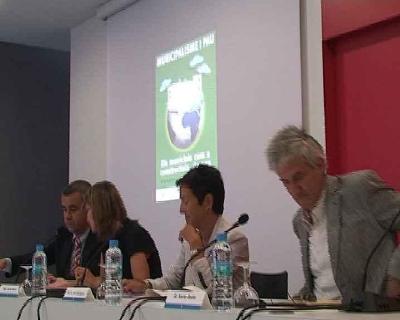|
|
Build Peace Starting from your Neighborhood
un articulo por Clara Sopeña*
On September 17, 2009, Sant Boi de Llobregat (Catalunya, Spain) hosted the conference
"Municipalism and Peace," with many experts discussing how local councils can help to end war and seek social justice.
The event was organized by the City Council of Sant Boi and the Diputacio of Barcelona in the framework of activities planned this year by the Group of Councils for Peace in the Province of Barcelona. During the meeting, several experts in the culture of peace and municipal representatives discussed and drew up concrete proposals to promote peace from the municipal level.

One of the panels in the Sant Boi Conference
This debate seems even more necessary in the present crisis situation, where the growing economic instability threatens to aggravate social tensions. Peace-building at local level means, among other things, conceiving the city within a comprehensive and inclusive vision of peace, generating a capacity of adaptation in scenarios that favor local development in the face of adversity, and, above all, promoting cohesion and social inclusion.
It has been fifteen years now since social movements began to demand the active engagement of public authorities for solidarity with other peoples and the eradication of poverty. The campaign of 0.7% achieved the commitment of many municipalities to allocate 0.7% of their resources to projects of cooperation and solidarity.
The cooperation of municipalities responded to this public demand for a commitment to social justice, at the same time as it launched a new approach to cooperation designed to avoid some of the problems of centralized cooperation which has been closely linked to political interests and trade, with a high degree of aid that was tied to debt-generating means such as FAD credit, etc..
If at the beginning, municipal peace-building was linked to NGO financing, since then it has gradually inserted the need for cooperation within a framework of broad public policy of the city that permeates the full range of municipal action. It has raised the possibility of promoting an active role of municipalities in project management, providing the added value of its public administration at the local level, and in direct collaboration with other municipalities.
On the other hand, it has also been necessary to accompany the cooperation with in-depth work in the North for awareness-raising and education for development, with the understanding that to create change in the structures that generate inequality and poverty, one must begin by questioning the foundations of the system has generated these structures.
Thus, new challenges have been added to the role of the city, so that it can play an active role in promoting peace in a double perspective: local and international. The conference of September 17 was organized by the city of Sant Boi and the Diputacio of Barcelona in order to further the specificities of this challenge, taking advantage of the lessons learned in fifteen years of cooperation,
* The author works for the Municipality of Sant Boi de Llobregat on issues of cooperation, solidarity and peace.
|








|
DISCUSSION
Pregunta(s) relacionada(s) al artículo :
What is a culture of peace city, and how does one become one?
* * * * *
Comentario más reciente:
I believe that the development of a network of culture of peace cities can be a decisive factor in the transition from a culture of war to a culture of peace based on a profound reform of the United Nations system. The following are excerpts from my book World Peace through the Town Hall.
My experience working in the United Nations system for ten years and observing it closely for seven years since my retirement makes me optimistic that the UN system is capable of managing a transition to the culture of peace. The various specialized agencies that deal with health care, education, food and agriculture, science, communication, not to mention technical questions such as aviation, shipping, atomic energy, etc. are staffed by a capable international secretariat with experience in the day-to-day management of global issues. The UN General Assembly, as well as the international assemblies of other agencies such as the General Conference of UNESCO, provide important forums. Even the Security Council, the World Bank and the International Monetary Fund which are now in the hands of a few powerful states and used to support their culture of war could play important roles in the transition to a culture of peace if they were transformed under control of "we the peoples" instead of the state.
For the reasons given throughout this book, a global network of local authorities is the best chance for an international political force independent of the nation-state that could take responsibility for the United Nations and direct it towards a culture of peace.
In summary, the cause of the United Nations seems hopeless for a culture of peace as long as it is under the control of the nation-states of the world with their culture of war.
Without being able to predict a precise date, we can expect within the next few decades that the American Empire and the globalized economy associated with it will crash as did the world economy in 1929 and the Soviet economy in 1989.
A global crash sets the stage for two possible political solutions which are diametrically opposite. One is a strengthening of the culture of war at the level of the state into fascism which was the predominant reaction in the 1930's. . ... continuación.

|
|









